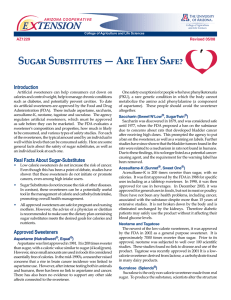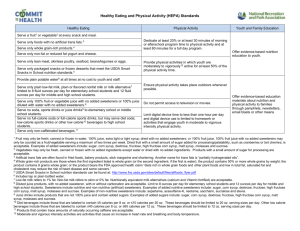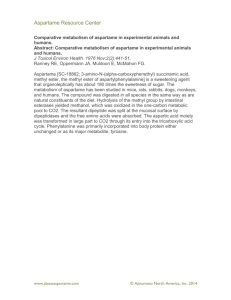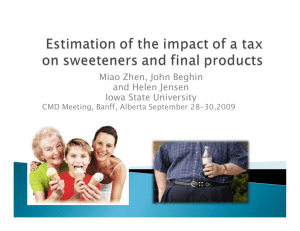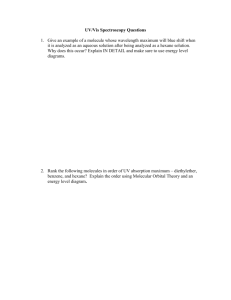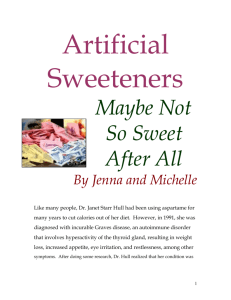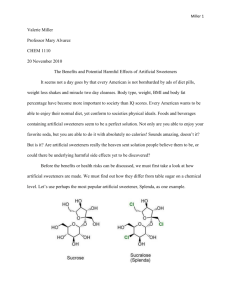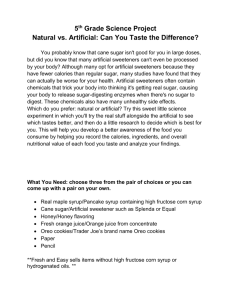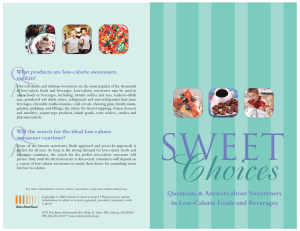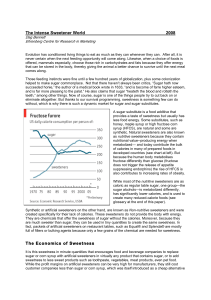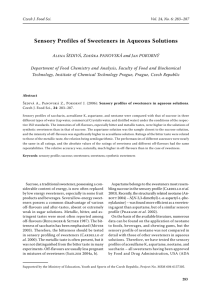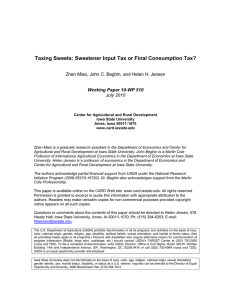Sweeteners - Owensboro Health Quest Medical Care
advertisement
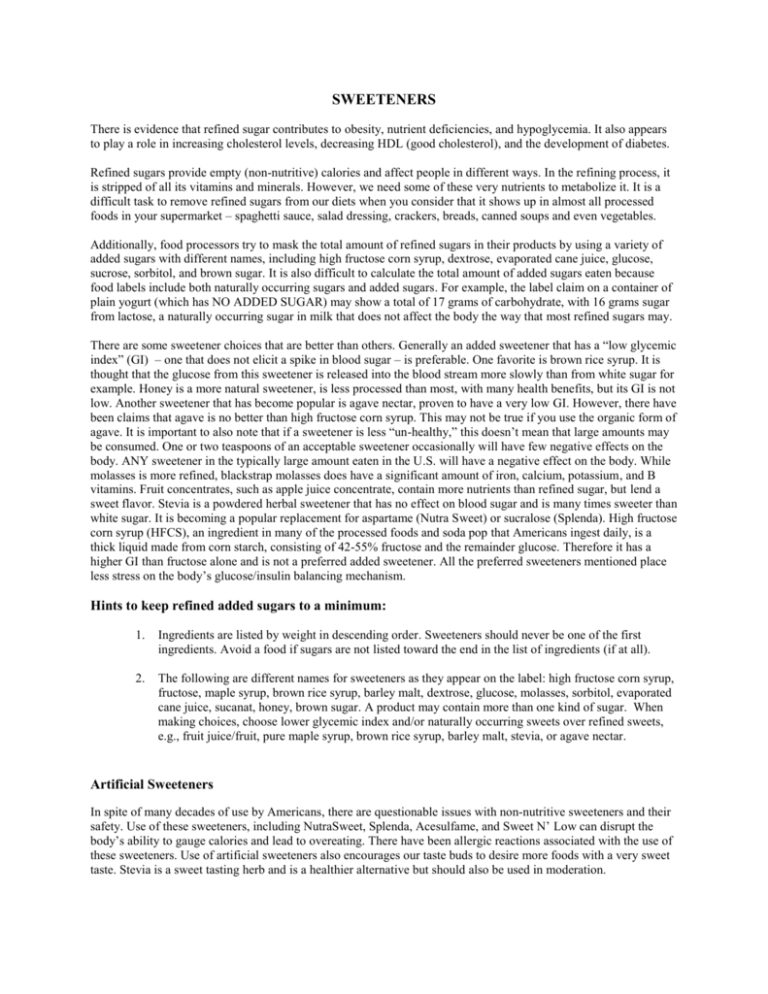
SWEETENERS There is evidence that refined sugar contributes to obesity, nutrient deficiencies, and hypoglycemia. It also appears to play a role in increasing cholesterol levels, decreasing HDL (good cholesterol), and the development of diabetes. Refined sugars provide empty (non-nutritive) calories and affect people in different ways. In the refining process, it is stripped of all its vitamins and minerals. However, we need some of these very nutrients to metabolize it. It is a difficult task to remove refined sugars from our diets when you consider that it shows up in almost all processed foods in your supermarket – spaghetti sauce, salad dressing, crackers, breads, canned soups and even vegetables. Additionally, food processors try to mask the total amount of refined sugars in their products by using a variety of added sugars with different names, including high fructose corn syrup, dextrose, evaporated cane juice, glucose, sucrose, sorbitol, and brown sugar. It is also difficult to calculate the total amount of added sugars eaten because food labels include both naturally occurring sugars and added sugars. For example, the label claim on a container of plain yogurt (which has NO ADDED SUGAR) may show a total of 17 grams of carbohydrate, with 16 grams sugar from lactose, a naturally occurring sugar in milk that does not affect the body the way that most refined sugars may. There are some sweetener choices that are better than others. Generally an added sweetener that has a “low glycemic index” (GI) – one that does not elicit a spike in blood sugar – is preferable. One favorite is brown rice syrup. It is thought that the glucose from this sweetener is released into the blood stream more slowly than from white sugar for example. Honey is a more natural sweetener, is less processed than most, with many health benefits, but its GI is not low. Another sweetener that has become popular is agave nectar, proven to have a very low GI. However, there have been claims that agave is no better than high fructose corn syrup. This may not be true if you use the organic form of agave. It is important to also note that if a sweetener is less “un-healthy,” this doesn’t mean that large amounts may be consumed. One or two teaspoons of an acceptable sweetener occasionally will have few negative effects on the body. ANY sweetener in the typically large amount eaten in the U.S. will have a negative effect on the body. While molasses is more refined, blackstrap molasses does have a significant amount of iron, calcium, potassium, and B vitamins. Fruit concentrates, such as apple juice concentrate, contain more nutrients than refined sugar, but lend a sweet flavor. Stevia is a powdered herbal sweetener that has no effect on blood sugar and is many times sweeter than white sugar. It is becoming a popular replacement for aspartame (Nutra Sweet) or sucralose (Splenda). High fructose corn syrup (HFCS), an ingredient in many of the processed foods and soda pop that Americans ingest daily, is a thick liquid made from corn starch, consisting of 42-55% fructose and the remainder glucose. Therefore it has a higher GI than fructose alone and is not a preferred added sweetener. All the preferred sweeteners mentioned place less stress on the body’s glucose/insulin balancing mechanism. Hints to keep refined added sugars to a minimum: 1. Ingredients are listed by weight in descending order. Sweeteners should never be one of the first ingredients. Avoid a food if sugars are not listed toward the end in the list of ingredients (if at all). 2. The following are different names for sweeteners as they appear on the label: high fructose corn syrup, fructose, maple syrup, brown rice syrup, barley malt, dextrose, glucose, molasses, sorbitol, evaporated cane juice, sucanat, honey, brown sugar. A product may contain more than one kind of sugar. When making choices, choose lower glycemic index and/or naturally occurring sweets over refined sweets, e.g., fruit juice/fruit, pure maple syrup, brown rice syrup, barley malt, stevia, or agave nectar. Artificial Sweeteners In spite of many decades of use by Americans, there are questionable issues with non-nutritive sweeteners and their safety. Use of these sweeteners, including NutraSweet, Splenda, Acesulfame, and Sweet N’ Low can disrupt the body’s ability to gauge calories and lead to overeating. There have been allergic reactions associated with the use of these sweeteners. Use of artificial sweeteners also encourages our taste buds to desire more foods with a very sweet taste. Stevia is a sweet tasting herb and is a healthier alternative but should also be used in moderation. In 2007, the American Heart Association published a study that implicated diet soda pop in the development of metabolic syndrome.1 Also, allergic reactions have been associated with known hazardous chemicals that may adulterate the popular sweeteners. Individual biochemistry governs the severity of reactions that may occur. Since artificial sweeteners are considered food additives, they are not subject to the plethora of food safely trials that drugs must undergo. Testing is often funded by the food industry, and misleading claims may be the end result due to the industry’s vested interest in the outcome. Most of the research performed on rodents found side effects that are of concern and it is likely that over time, these negative effects will be seen in humans. Additionally, much of the research is limited by the short length of the studies.2 One study surprised many when it reported that caloric intake and hunger were actually shown to increase after ingesting aspartame in diet soda pop.3 Several studies have connected headaches, including migraines, with the use of aspartame and sucralose. 4-9 A study with aspartame revealed increased inflammation in blood vessels,10 and lastly, a recent study revealed that aspartame induced lung and liver cancers in mice. 11 A 2008 report from the Center for Science in the Public Interest (CSPI) summarized some of the concerns regarding certain popular non-caloric sweeteners.12 CSPI is a non-profit consumer health group that is not supported by government or industry funding. It advocates honest advertising and food labeling, along with safer and more nutritious foods. The report found that artificial sweeteners have NO food value, contain potential by-products with harmful toxic side effects, and they trick the body into thinking it is eating something sweet, which encourages an increase in sweet cravings. CSPI has recommended that perhaps everyone, but especially young children, might avoid all artificially sweetened foods. It is quite possible to use small amounts of the herbal sweetener, Stevia, while learning to adjust to the natural sweetness of whole fruits and vegetables. References 1. Dietary intake and the development of the metabolic syndrome: the Atherosclerosis Risk in Communities study. Lutsey PL, Steffen LM, Stevens J. Circulation. 2008 Feb 12;117(6):754-61. Epub 2008 Jan 22. 2. Repeated dose study of sucralose tolerance in human subjects. Baird IM, Shephard NW, Merritt RJ, Hildick-Smith G.Food Chem Toxicol. 2000;38 Suppl 2:S123-9. 3. The effect of sucrose- and aspartame-sweetened drinks on energy intake, hunger and food choice of female, moderately restrained eaters. Lavin JH, French SJ, Read NW. Int J Obes Relat Metab Disord. 1997 Jan;21(1):37-42. 4. Migraine MLT-down: an unusual presentation of migraine in patients with aspartame-triggered headaches. Newman LC, Lipton RB. Headache. 2001 Oct;41(9):899-901. 5. Aspartame as a dietary trigger of headache. Lipton RB, Newman LC, Cohen JS, Solomon S. Headache. 1989 Feb;29(2):90-2. 6. Aspartame ingestion and headaches: a randomized crossover trial. Van den Eeden SK, Koepsell TD, Longstreth WT Jr, van Belle G, Daling JR, McKnight B. Neurology. 1994 Oct;44(10):1787-93. 7. Adverse reactions to aspartame: double-blind challenge in patients from a vulnerable population. Walton RG, Hudak R, and Green-Waite RJ. Biol Psychiatry. 1993 Jul 1-15;34(1-2):13-7. 8. Popular sweetener sucralose as a migraine trigger. Patel RM, Sarma R, Grimsley E. Headache. 2006 Sep;46(8):1303-4. 9. Migraine triggered by sucralose--a case report. Bigal ME, Krymchantowski AV. Headache. 2006 Mar;46(3):515-7. 10. Alleva R. et al. In vitro effect of aspartame in angiogenesis induction. Toxicol In Vitro. 2010 Sep 17. 11. Soffritti M et al. Aspartame administered in feed, beginning prenatally through life span, induces cancers of the liver and lung in male Swiss mice. Am J Ind Med. 2010 Sep 30. [Epub ahead of print] 12. Nutrition Action Healthletter, Center for Science in the Public Interest, May 2008 http://www.cspinet.org/reports/chemcuisine.htm
